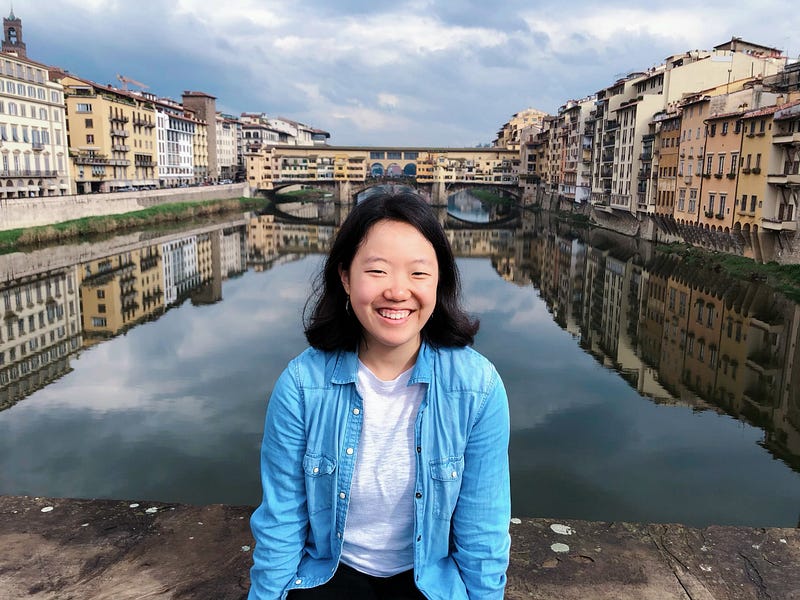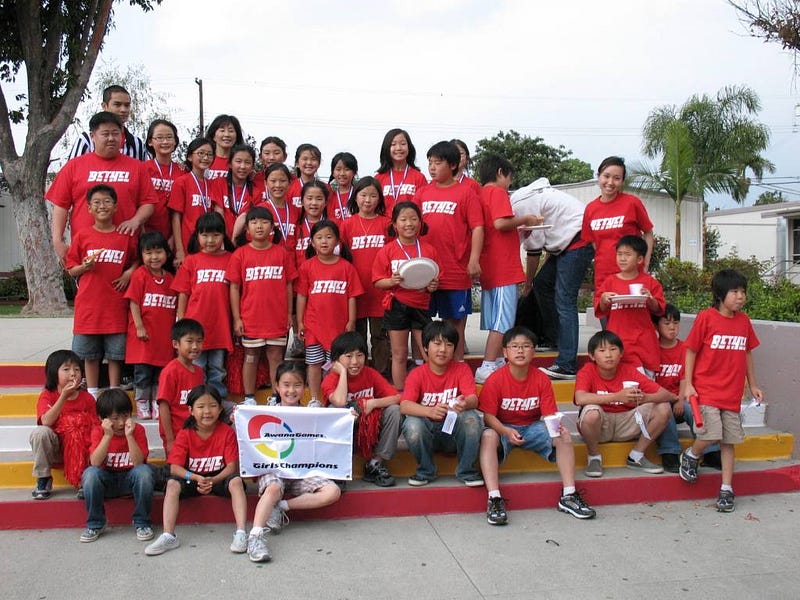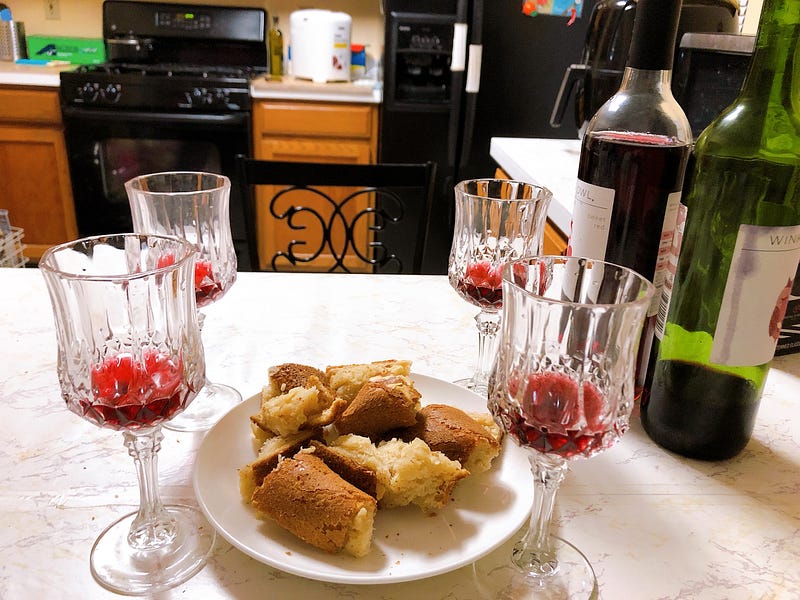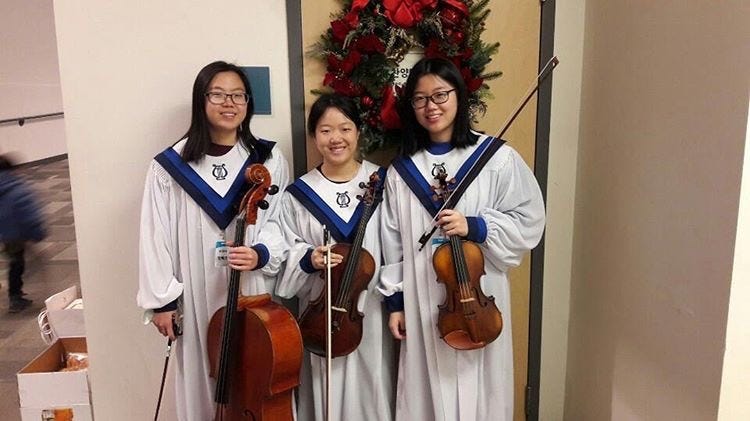
Jiin Jeong ’21 is a Computer Science and Economics double major from Seongnam, South Korea. In this article, she talks about faith, religion, and COVID-19. Photo courtesy of Jiin Jeong ’21
From Where I Sit is an ongoing column associated with the ESOL program that aims to share the stories and experiences of international students.
I’ve been a Christian for as long as I can remember. My childhood memories are filled with waking up at 5AM for early morning prayer service (
saebyeok-gido,
as we call it in Korean), seeing people dressed up as Bible characters and angels instead of as witches and goblins on Halloween, and attending Vacation Bible School during summer breaks. In fact, one of the first English songs that I learned was at Sunday School, which went: “Milk, drink that milk. Eat the Word [Bible]. And get stronger.”

A photo from elementary school with the writer’s Awana group, a child/youth discipleship program. Photo courtesy of Jiin Jeong ’21
As I grew, my faith did as well, as I learned to embrace the Protestant Christian identity as my own, not merely one passed down from my parents. In high school, I co-led the Christian community, holding daily Bible studies from 11PM-11:30PM after a long day of classes. Faith continues to play an important role for me; on campus, Hamilton Christian Fellowship and All Beliefs Union are two communities where I found a home. I would be lying if I said that my faith journey was straightforward and smooth. With religion increasingly being characterized as unscientific, outdated, and divisive, I sometimes shy away from speaking about my Christian identity even to this day.
During this pandemic, I’ve been observing how the pandemic greatly affects the way I practice my faith. Since I was young, my parents have always emphasized the importance of physically going into churches for services, encouraging me to dress my best and prepare clean bills for offerings. Now, our weekly 50-minute drives to church turned into gatherings in the living room couch as we tune into live-streams from our laptop. My church recently started a Bible transcription project, so I started meditating on and handwriting chapters 10 to 14 in the Gospel of Luke. It felt especially strange to stay home for Lent and Easter, some of the most significant days for Christians. During Lent, my younger sister decided to partake in social media fasting, noticing her increased reliance on her phone and decreased attention on God following the stay-at-home order. On Easter, after a Youtube service, my family held an informal communion at home with freshly-baked bread and wine. I also got a surprise Easter package in the mail from a Hamilton Christian Fellowship friend, making up for the lack of eggs and chocolates that I typically would’ve received at church.

My writer’s family’s home communion. Photo courtesy of Jiin Jeong ’21
Paradoxically, social distancing has been helping me to stay more connected with my current and previous Christian communities. This semester, I studied in Stockholm through the Swedish Program, a study abroad experience that was unexpectedly cut short. Thankfully, Zoom allows me to continue to participate in my Tuesday Young Adults Bible study and keep updated on the situation in Sweden, which is taking an interesting approach by refusing to lock down like many of its European peers. I’ve also been reconnecting with my past communities in Hungary and Korea, and it’s been an educational and challenging experience for all of us as we navigate how to worship, pray, and talk about the Bible together virtually. Of course, seeing Jeff McArn, Hamilton College’s Chaplain, carry out his
Weekly Vespers
from his living room, is always a pleasant addition to my week.
As religious faith is often practiced in a communal way, the relationship between faith and COVID-19 goes further than being merely a personal matter. Whereas some figures might use the pandemic as a weapon to target minority religions in their countries, other religious leaders will relay messages of hope, peace, and solidarity. Whereas some organizations defy federal and state order to hold services, others move online and seek ways to help vulnerable populations. Seeing the diversified responses of churches and the religious community were at times heartbreaking and disappointing, but other times, heartwarming and encouraging. As a believer, I can’t help but feel the pressure to some extent that I represent the community and vice versa.
In my home country Korea, religion had a significant impact on the spread of the virus. Many of the COVID-19 cases can be traced to the Shincheonji Church of Jesus, a cult that claims its founder Lee is the Second Coming of Christ. In February, there was a mass outbreak in the Daegu and Gyeongbuk region due to a member of Shincheonji’s Daegu branch infecting other worshipers during services. At one point in March, Shincheonji-related cases accounted for over 60% of Korea’s 7,400 confirmed cases. Ever since the social distancing policy placed in March, churches and large gatherings have been shut down. The Korean government noticed that smaller churches were having a harder time complying with social distancing rules due to financial and technical concerns. In order to fix this, it started providing online services technology to religious organizations with 200 or less members, as well as opportunities to conduct drive-in services.
My faith has undeniably played an important role as I dealt with the pandemic. Last week, my Bible study group and I discussed the names of God, including
Jehovah-Rapha
(the Lord heals)
and
Jehovah-Shalom
(the Lord is peace), and I felt calm and protected despite the uncertainties. The recurring Bible studies and Sunday services, especially now that my classes are over, have been reassuring routines to my week. “Church is not a building,” my Hungarian pastor said, and as such, I find myself regarding every moment and place to be times and locations of worship. Church buildings may be closed, but faith lives on in homes and hearts (and through the Internet).
Wherever you are and whatever faith or spirituality you hold in your heart, I hope that you will find a way to practice what you believe in a safe and loving fashion. As cliché as it may sound, I, along with my family, will be keeping you in our thoughts and prayers.
“Cast all your anxiety on him because he cares for you.” — 1 Peter 5:7

Whenever the writer come home for breaks, she plays in her home church’s orchestra with her sisters. “I can’t wait to rejoin when it becomes safe for the society to reopen.” Photo courtesy of Jiin Jeong ’21
















